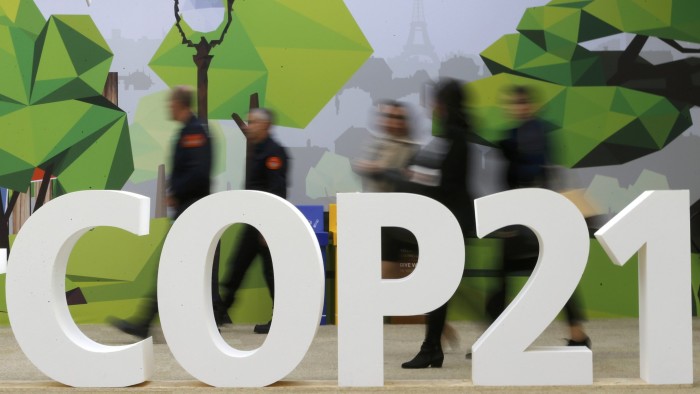COP21: US adds weight to group pushing for strong climate deal

Roula Khalaf, Editor of the FT, selects her favourite stories in this weekly newsletter.
The US has unexpectedly joined a large group of countries trying to isolate China and India in the tense home stretch of UN talks in Paris on a new global climate agreement.
The group, which has dubbed itself the “high ambition coalition”, claims to include about half the 195 nations involved in the two-week Paris meeting known as COP21, which is due to end on Friday.
“This is our moment and we need to make it count,” said Todd Stern, the US climate envoy, as he joined ministers from the EU, Latin America, Africa and Pacific islands at a news conference on Wednesday evening to demand that the new accord contain measures that China, India, Saudi Arabia and other nations are trying to resist.
That includes an acknowledgment that global temperatures should not rise more than 1.5C from pre-industrial times and provisions to ensure this goal is met by requiring countries to update their emissions reduction pledges every five years, starting as soon as possible.
The pledges that more than 180 countries have tabled for the Paris accord would see warming rise above 2C, a threshold that governments agreed should not be breached at UN climate talks five years ago.
“There are some countries here who are not in the coalition and, indeed, would seek a more minimal outcome,” said Mr Stern, declining to single out countries by name.
But the nations identified themselves later in the night when delegates met to consider the latest version of the draft accord produced during the day, a 29-page document riddled with competing options on a slew of contentious issues.
“I understand fully the demand for mentioning 1.5C,” said Prakash Javadekar, India’s environment minister. “However, a 1.5C goal would require developed countries to massively reduce their emissions and massively scale up their financial support to developing countries. This is not happening.”
Some delegates pushing for a stronger agreement are privately voicing concerns that the 1.5C goal might end up being traded off in exchange for India and China supporting five-yearly pledging updates.
John Kerry, the US secretary of state, had tried to ease concerns about financial aid earlier in the day with a vow that by 2020, Washington would have doubled the $430m it delivered in 2014 to help poor countries adapt to climate change.
But Mr Javadekar warned that a lasting climate accord “cannot be crafted by diluting historical responsibilities or by putting the polluters and the victims at the same level”.
This is a reference to another contentious issue in the talks: a demand by the US and others that the new accord require developing countries to gradually take on emissions reporting obligations that only wealthy countries are subject to at present.
Malaysia’s delegate, Gurdial Singh Nijar, representing a group of countries including China and Saudi Arabia, complained that the concept of “differentiation” between rich and poor countries had been “disembowelled” in the latest text.
Despite the occasionally terse language, last night’s meeting was unusually orderly and polite for UN climate events which regularly descend into angry exchanges as they near a close.
The calm tone of the Paris meeting, which started just two weeks after the French capital was struck by terrorist attacks that killed 130 people, has been particularly notable for a meeting aimed at forging a historic new climate accord.
That has given rise to hopes that it might set a record for such events by ending on the appointed day on Friday.
But with so many issues yet to be decided, it still seems more likely that delegates will be negotiating well into Friday night.
Comments